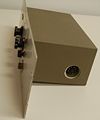122: Difference between revisions
No edit summary |
No edit summary |
||
| Line 10: | Line 10: | ||
<gallery> | <gallery> | ||
Image:Tek 122 x.jpg | Image:Tek 122 x.jpg|early model | ||
Image:Tek 122 x2.jpg | Image:Tek 122 x2.jpg|early model | ||
Image:Tek 122 front.jpg | Image:Tek 122 front.jpg|early model | ||
Image:Tek 122 power.jpg | Image:Tek 122 power.jpg|early model | ||
Image:Tek 122 front close.jpg | Image:Tek 122 front close.jpg|early model | ||
Image:Tek 122 bottom inside.jpg | Image:Tek 122 bottom inside.jpg|early model | ||
Image:Tek 122 top inside.jpg | Image:Tek 122 top inside.jpg|early model | ||
Image:Tek 122 schem.png | Image:Tek 122 schem.png | ||
Image:Tek 122 int right.jpg | Image:Tek 122 int right.jpg|late model | ||
Image:Tek 122 int panel.jpg | Image:Tek 122 int panel.jpg|late model | ||
Image:Tek 122 late int left.jpg | Image:Tek 122 late int left.jpg|late model | ||
Image:Tek 122 late front.jpg | Image:Tek 122 late front.jpg|late model | ||
</gallery> | </gallery> | ||
Revision as of 18:20, 25 August 2011
The Tektronix 122 is an external low-frequency low-level preamplifier. The low-frequency cutoff and high frequency cutoff can be selected. 40kHz is the highest cutoff. The input is differential, using an XLR pro-audio style connector. The output is through a UHF (SO-239) connector, single-ended. The amplifier electronics are on a plastic board with metal studs where components are soldered in place. The board is mechanically isolated from the case by four rubber bushings.
The 122 has four stages of amplification. The first stage is a direct-coupled differential amplifier formed by both halves if a 12AX7 dual-triode tube. The total plate current of the input stage is about 450uA. The second stage is a 12AU7 differential amplifier, differentially driven by the first stage. There are DC blocking capacitors between plates of the first stage and the grids of the second stage. The second stage is coupled to the third stage by capacitors, which can be switched to select the low-frequency cutoff frequency. The third stage is a common-cathode amplifier formed from one half of a 12AU7 dual triode tube. The plate load resistors of the third stage amplifier are shunted by switchable capacitors, allowing the high-frequency cutoff to be selected. The resulting signal is buffered by a cathode-follower stage formed from the other triode in the third stage's 12AU7 tube, biased at 1.8mA plate current. The output impedance is rated to be about 1000 ohms.
For low noise performance and freedom from oscillations, the power supplies in the 122 are carefully bypassed. The B+ supply of +135VDC comes in to the 122 through an octal connector. The raw voltage coming in is used for the plate supply of the output (fourth) stage. That voltage is low-pass filtered to produce voltage "C" which is used as the plate supply for the third stage. Voltage "C" is low-pass filtered to produce voltage "B", the plate supply for the second stage. Finally, voltage "B" is low-pass filtered to produce voltage "A", the plate supply for the first stage. The result is that the sensitive first and second stages have well filtered plate supplies. This technique is also seen in other gear from the era, such as the McIntosh MC-30 audio power amplifier.
-
early model
-
early model
-
early model
-
early model
-
early model
-
early model
-
early model
-
-
late model
-
late model
-
late model
-
late model









